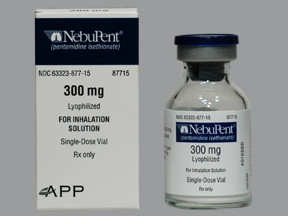PENTAMIDINE ISETHIONATE - INHALATION
PHONETIC PRONUNCIATION: (pen-TAM-i-deen EYE-se-THYE-oh-nate)
COMMON BRAND NAME(S): Nebupent
GENERIC NAME(S): pentamidine isethionate
Uses
USES: Pentamidine given by inhalation is used to prevent a serious lung infection (Pneumocystis pneumonia-PCP) in people with acquired immunodeficiency syndrome (AIDS). Pentamidine belongs to a class of drugs known as antiprotozoals. It works by killing the organism that causes the infection.
How to use PENTAMIDINE ISETHIONATE - INHALATION
HOW TO USE: This medication is given by a health care professional as directed by your doctor, usually once every 4 weeks. It is given using a special machine called a nebulizer that changes the solution to a fine mist that you inhale. Each treatment usually takes 30 to 45 minutes. You may also be given another inhaled medication (such as albuterol) to help open your airways before each treatment with pentamidine. Learn and follow all instructions for the use of this medication and the nebulizer. If you have any questions, ask your doctor, pharmacist, or respiratory therapist. The dosage is based on your medical condition and response to treatment. Use this medication regularly to get the most benefit from it. To help you remember, mark your calendar to keep track of when to schedule the next dose. Tell your doctor right away if you develop symptoms of infection such as breathing problems, cough, or fever between treatments.
Side Effects
Precautions
Interactions
Overdose
Images
Reviews
Faq for PENTAMIDINE ISETHIONATE - INHALATION
- Pentamidine isethionate inhalation is used for the prevention and treatment of Pneumocystis jiroveci pneumonia (PCP), a severe lung infection commonly seen in individuals with weakened immune systems, such as those with HIV/AIDS.
- Pentamidine isethionate is a medication that works by killing the microorganism Pneumocystis jiroveci, which causes PCP. Inhaling the medicine delivers it directly to the lungs, where it can act specifically on the infection.
- Pentamidine isethionate inhalation should be used as directed by a healthcare professional. It is typically administered once every four weeks using a special nebulizer device via oral inhalation.
- Common side effects of pentamidine isethionate inhalation include cough, wheezing, shortness of breath, throat irritation, bad taste, and low blood sugar. Serious side effects may include kidney damage, changes in blood pressure, irregular heartbeats, and allergic reactions. It is important to report any side effects to a healthcare provider.
- Yes, there are several precautions and warnings associated with pentamidine isethionate inhalation. It should not be used during pregnancy unless absolutely necessary. It may interact with other medications, so it is important to inform your doctor about all the medications you are taking. Additionally, pentamidine isethionate may lower blood sugar levels, so individuals with diabetes should monitor their blood sugar levels closely.
- Trimethoprim-sulfamethoxazole (TMP-SMX) is the preferred and most commonly used medication for the prevention and treatment of PCP. However, for individuals who cannot tolerate or have contraindications to TMP-SMX, pentamidine isethionate inhalation is an alternative treatment option.
Disclaimer
IMPORTANT: HOW TO USE THIS INFORMATION: This is a summary and does NOT have all possible information about this product. This information does not assure that this product is safe, effective, or appropriate for you. This information is not individual medical advice and does not substitute for the advice of your health care professional. Always ask your health care professional for complete information about this product and your specific health needs.

No Reviews Yet